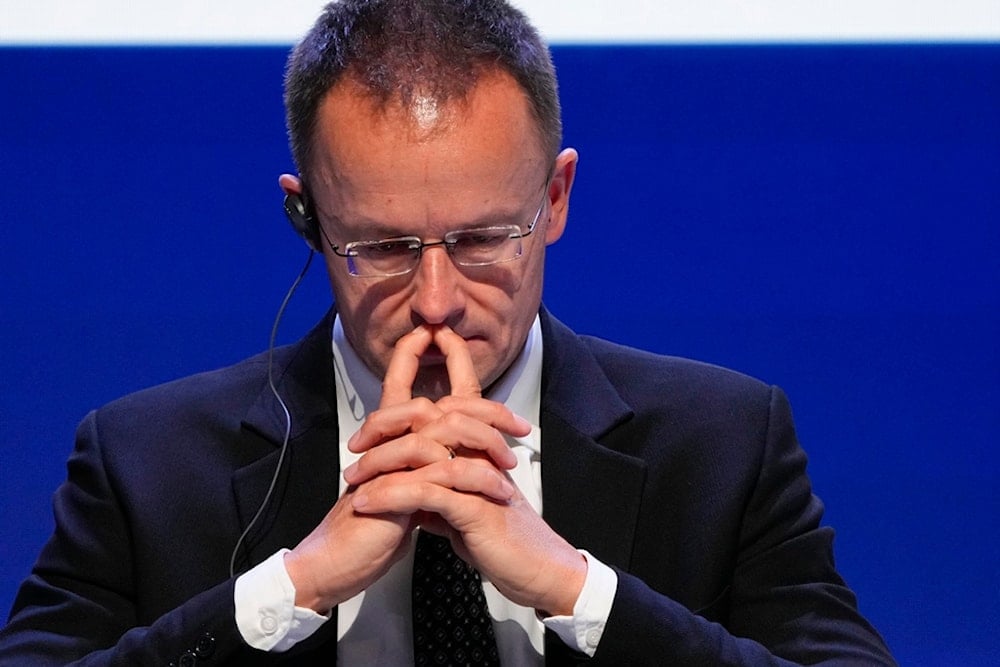Hungary says to block Ukraine EU bid, Kiev ready to replace it
Hungary's foreign minister says his country would block Ukraine's EU accession over its bill to suspend Russian energy transit through its territories.
-

Hungary's Foreign Minister Peter Szijjarto attends a plenary session at the St. Petersburg International Gas Forum in St. Petersburg, Russia, Thursday, Oct. 10, 2024 (AP)
Hungarian Foreign Minister Peter Szijjarto criticized a proposed Ukrainian parliamentary bill to suspend Russian oil and gas transit through Ukraine during martial law, calling the measure "unacceptable" in a Wednesday Facebook post.
The bill, submitted Tuesday by former Ukrainian President Petro Poroshenko and members of the opposition European Solidarity party, seeks to ban the transit of Russian energy resources through Ukrainian territory.
Szijjarto highlighted Hungary's reliance on Russian energy and its potential veto power over Ukraine's aspirations to join the European Union. "The reality is that in the EU, member states collectively and unanimously decide on the admission of new members. In other words, each member state has to vote in favor," he said, underlining Hungary's influence in the process.
The EU initiated accession negotiations with Kiev in December 2023, signaling progress in its bid for membership.
Ukraine not to renew gas transit agreement with Russia
While Ukraine has decided not to renew its gas transit agreement with Russia beyond December 31, 2024, it continues to allow Russian oil transit via the Druzhba pipeline under a contract valid until the end of 2029. Szijjarto argued that Ukraine's association agreement with the EU obliges it to contribute to the bloc's energy security by maintaining transportation routes.
"Each state has the sovereign right to decide from where and how it buys the energy resources it needs to function, and no one has the right to impose more expensive energy resources on another country," Szijjarto stated.
Hungary, along with Slovakia and Austria, depends heavily on Russian gas, purchased through Gazprombank, which is under Western sanctions. Szijjarto claimed that halting energy transit would harm Hungary and contravene EU expectations for Ukraine's integration. He also accused Ukraine of exacerbating Europe's economic challenges, alleging that its actions have driven up gas prices on the EU market.
Szijjarto's remarks come amid ongoing criticism of Hungary for its Moscow-friendly stance. Budapest has frequently blocked sanctions against Russia and aid packages to Ukraine, setting itself apart from other EU member states.
Szijjarto has maintained relations with Moscow during the war, drawing further scrutiny from European partners. The proposed Ukrainian bill and Hungary's reaction underscore the complex dynamics of energy security, EU integration, and regional alliances amid the ongoing conflict in Ukraine.
Ukraine ready to fill 'EU vacancy'
In response, Ukraine declared its readiness to fill "any vacant space" in the European Union and NATO should Hungary decide to leave these organizations and join Russian-led blocs, according to a statement from its Foreign Ministry on Wednesday.
"Ukraine would be ready to fill any vacant space in the EU and NATO if Hungary chooses to vacate it in favor of membership in the CIS (Commonwealth of Independent States) or CSTO (Collective Security Treaty Organization)," the statement read.
Ukraine dismissed Szijjarto's comments as part of a "politically motivated information campaign intended for domestic consumption." The ministry pointed to a European Commission statement on January 1 affirming that the transit halt had not adversely impacted the EU's energy security or consumer prices.
"The sole reason for the challenges in the European energy market has always been Russia," the statement asserted, accusing Moscow of decades of weaponizing energy resources to undermine European security.
Ukraine emphasized that the EU was moving beyond its dependence on Russian energy, with countries diversifying supplies from the US and the Middle East.
"Only two out of twenty-seven EU countries have struggled with this task and are now attempting to pass their problems with the blame on others," the statement added, indirectly referencing Hungary.
The ministry called on Hungary to clarify its priorities, stating, "Hungary should openly acknowledge if it prioritizes strengthening Russia over the EU and the United States." It urged Budapest to focus on strengthening EU unity and energy independence instead of "undermining" collective efforts.

 4 Min Read
4 Min Read









